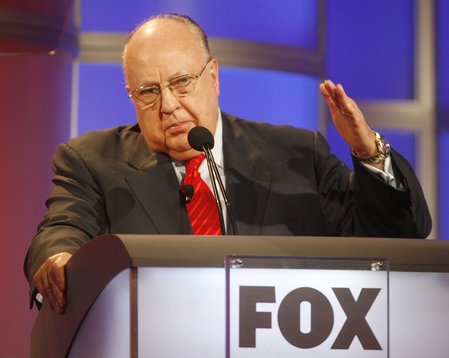Advertisement
Divisive Ailes gave conservatives a TV home at Fox News

By Lisa Richwine and Ginger Gibson
(Reuters) – When Roger Ailes arrived at Fox News Channel two decades ago, his mandate from media titan Rupert Murdoch was to create a network to compete against established market leader CNN and its new rival MSNBC.
Ailes had long experience as both a television producer and a Republican strategist, and that background helped him to formulate a winning strategy: hire charismatic talent to appeal to a conservative audience.
Ailes, who resigned from Fox News on Thursday amid sexual harassment allegations, built the network into the top-rated cable news channel in the United States, a profit center for Twenty-First Century Fox <FOXA.O> and an influential force in Republican party politics.
Critics said Ailes pushed a Republican agenda under the oft-repeated slogan “Fair and Balanced.” His fans said he smartly recognized that conservative TV viewers weren’t seeing their viewpoints reflected on Time Warner Inc’s <TWX.N> CNN or major broadcast networks.
“Fox for the last 20 years has been a place where we know our values are respected and we’re able to share our views openly,” said Penny Nance, head of the conservative Concerned Women for America, in an interview at the Republican National Convention in Cleveland. “It’s been a great place for conservatives.”
Ailes’ reign ended following allegations of sexual harassment by former host Gretchen Carlson. Ailes has denied Carlson’s charges.
In a statement, Murdoch praised Ailes’ work at the company.
“His grasp of policy and his ability to make profoundly important issues accessible to a broader audience stand in stark contrast to the self-serving elitism that characterizes far too much of the media,” Murdoch said.
Ailes, in a letter released by his attorney and addressed to Murdoch, said he took “particular pride” in the role he played in advancing the careers of women he promoted to executive and on-air roles.”Fox News has become Number 1 in all of cable because I consistently identified and promoted the most talented men and women in television, and they performed at the highest levels,” he said.
Ailes’ uncertain future was a topic of frequent discussion at the Republican convention this week ahead of his resignation, with many conservatives expressing fear and concern that the network may never be the same. “I do worry with different leadership that same winning formula won’t be respected,” Nance said.
Reporters and producers waiting in line for buses in Cleveland gossiped about Ailes’ likely departure. Delegates and activists speculated about who could replace him, all while Fox News Channel’s stars were on site anchoring hours of coverage that reeled in higher ratings than any of their competitors.
“Roger’s left a strong foundation so there really shouldn’t be any concern,” said Michael Steele, former Republican chairman and an MSNBC commentator. “He opened that door for a lot of conservatives and that’s a good thing.”
Fox News Channel went on the air in 1996, just before Bill Clinton was elected to a second term, and Ailes, a former adviser to Republican Presidents including George H.W. Bush, was the network’s founding chief executive.
Ailes brought lessons from his days as a TV producer for “The Mike Douglas Show.” He had an eye for picking talent like Bill O’Reilly and Sean Hannity who have been stars for years, said Merrill Brown, a former media executive who helped launch MSNBC.
Ailes also took a page from entertainment networks by building a strong brand, said Brown, director of Montclair State University’s School of Communication and Media.
At Fox News, “they stand for something,” Brown said. “Whether it is a hard news program or an opinion show, they have an energy to it and a liveliness and a consistency.”
Not everyone applauded the effect Ailes had on television news.
“Before Roger, everyone in journalism was obligated to strive to be objective,” said Dan Cooper, an executive who worked with Ailes in the early days of Fox News Channel. “Now, bias is considered a positive. He demolished the objective standard in journalism.”
To liberal activists, Ailes was more than biased. They saw him as responsible for infecting political discourse with rancor and negativity.
“He helped market a brand of pseudo-journalism that revolves basically around hate rhetoric, divisiveness, pitting people against each other,” said Eric Boehlert, senior fellow at liberal media watchdog Media Matters for America. “That seeps into the culture and into politics.”
Competitor MSNBC, owned by Comcast Corp <CMSCA.O>, has tried to become the liberal counterpart to Fox News, but hasn’t come close to Fox’s ratings success.
Despite the criticism that Fox pushes a conservative view, its anchors have won praise from media analysts this election season for tough questioning of Republican candidates in primary debates.
Donald Trump has sparred with the network often during his campaign and at one point called on his followers to boycott Fox anchor Megyn Kelly because he felt she had treated him unfairly. He refused to participate in a debate held in January because Kelly would be among the anchors questioning him.
Eventually, Trump and Murdoch made peace, holding private meetings. Trump resumed appearing on the network.
Republican Rep. Darrell Issa of California, a regular on the network, said Ailes presented a “centrist truth” that people couldn’t find elsewhere and included both sides of a debate.
“What Roger built I believe will be preserved and maintained because it’s simply good capitalism,” said Issa, a favorite of Fox for having led the charge, in his former role as chairman of the House Oversight Committee, to investigate the attack in Benghazi and the IRS.
Former House Speaker Newt Gingrich, who spoke at the GOP convention this week, seemed less certain about the effect of Ailes’ departure.
“Fox really today is the dominant communication media for conservatives, something which Trump has understood and used brilliantly,” Gingrich said, speaking outside a convention event. But as for whether it will stay that way, he said, “Who knows?”
(Reporting by Lisa Richwine in Los Angeles and Ginger Gibson in Cleveland; Editing by Sue Horton and Lisa Girion)











